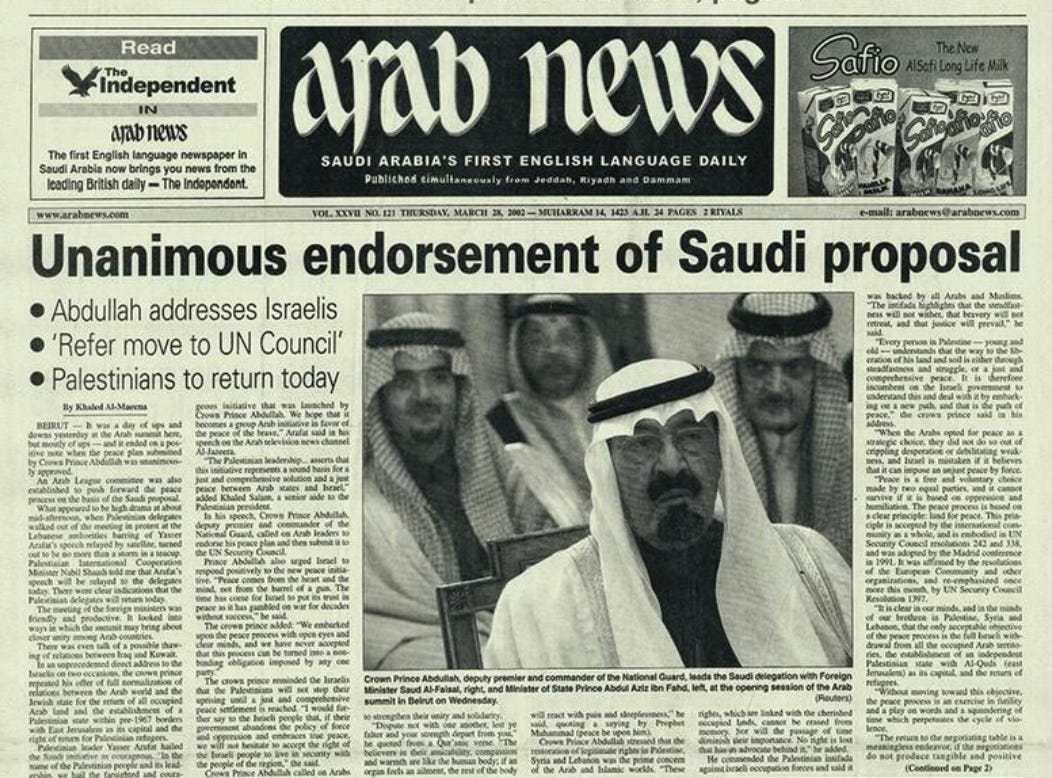It is the long peace that is urgently needed
An Arab Peace Investment Dividend could be the answer to change incentives
As all sides work furiously towards solidifying the short-term resolution of the current crisis in the Middle East, it seems premature to look towards distant horizons. However, it is precisely now when we should be doubling down on the long peace in the Middle East. In fact, without doing so, the risk of another round of violence recurring is all but guaranteed.

It was President Donald Trump himself who talked about the current negotiations forging a new dynamic to break the trajectory of thousands of years of history. There is debate on how far back to trace the historical enmity that prevails today. Nevertheless, it has indeed been millennia since all peoples, and the three Abrahamic faiths specifically, converged on a united position on Jerusalem.
Many prior agreements have fallen short in finalizing peace. The Abraham Accords. The Roadmap to Peace. The Oslo Accords. Camp David. And beyond. Ultimately, they involved political persuasion, legal frameworks, and pageantry.
Of course, these aspects are important. But more is needed. We must accept that our world has moved beyond the nation-state framework and tribalism. Today, what holds things in place more than anything is power and the ultimate materialistic motivator: money.
Ignoring this dimension will mean that failure is inevitable. The financial construct to shift incentives, however, cannot be superficial or peripheral. It must be central and overwhelming. Furthermore, it must be established before, not after, a negotiated settlement, at least as a formal mechanism. It is the promised incentive to forge a settlement today.
The last chapter of Middle East in Crisis & Conflict: A Primer released last year presaged the contours of the current discussions on the Gaza crisis. In fact, the deal brought by President Trump is similar to what many policymakers, leaders, and analysts have roughly outlined for quite some time. Then, as now, it is not enough for the long peace. As the primer echoes, “These steps, already perhaps unrealistic, would still be insufficient. This is obvious to even the casual observer. Pipe dreams for peace are part of the realpolitik scenario.”
A central idea in the book and raised elsewhere, such as at the Milken Conference in Los Angeles in 2024, was the Arab Peace Investment Dividend, “a $1 trillion investment fund that will flow directly into the Israeli and Palestinian private sector the day after a peace deal is signed. With a 10-year time horizon, $100 billion will be funded and disbursed year-on-year. It would be the greatest investment dividend per capita in modern history. It shows actual skin in the game by global and regional actors in peace. And it demonstrates to Israelis and Palestinians alike the financial upside in a financial world.”
A trillion-dollar fund for peace seems like a pipe dream, but with nearly $5 trillion of sovereign capital situated in the region, it is much closer at hand. With interconnected capital flows, it is hardly a stretch to see other sovereign wealth funds from Europe and East Asia join in, alongside pension funds from North America. Development finance institutions, more broadly, could also be added to the table. There is no doubt that the investment could be mobilized and committed with the right political push.
Unlike prior proposals, this would not be a conceptual talking point but a fully formed legal entity, with strict guidelines on the types of recipients who would have to originate from, be based in, and serve the region and interests of peace. While the Arab Peace Initiative in 2002 provided the political capital for a common future, the Arab Peace Investment Dividend would provide the investment capital for shared prosperity.
Of course, President Trump must also be brought onside, who would be one of its biggest advocates. It may need to be renamed to the Abraham Peace Investment Dividend, to match the style with the substance.
Now is the time for this investment initiative to take hold. Yet, without a transformative figure taking the mantle, it will still fall short. It is only natural that it should have a convener of stature, perhaps a leader of one of the Gulf countries themselves. That leader would also give it an inspiring vision and sense of purpose, which is what would sustain the long peace and provide it with the depth to survive.
Today is the moment for boldness. Who will take the mantle of leadership not just for profit but also for peace?
The world is waiting.
